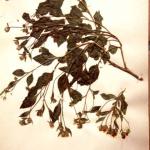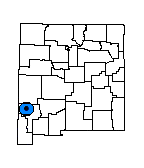Brickellia chenopodina
COLEOSANTHUS CHENOPODINUS GREENE
Shrub, much branched; stems stout, glandular above, bark exfoliating; leaves alternate, simple, petiolate, ovate to lanceolate, averaging 35 mm long, somewhat thick and succulent, glabrous or nearly so, acute at the apex, rounded to cuneate at the base, margins serrate; heads approximately 12 mm in height with about 28 flowers, paniculate, on slender, leafy, glandular-viscid peduncles 2-4 cm long; involucral bracts lanceolate or the inner bracts linear-oblong, glandular-viscid, acute to obtuse, conspicuously nerved, some of the outer bracts often foliaceous and as long as or longer than the corolla; flowers white to pinkish in color, perfect and tubular; achenes 10-nerved, faintly strigose; pappus of minutely barbed capillary bristles. Flowers September and October.
Brickellia floribunda has cordate leaf bases and peduncles 4-10 mm long.
New Mexico, Grant County, Gila River Valley.
Restricted to alluvial soils along the Gila River; 1,370 m (4,500 ft).
Known only from the type collection. According to Dr. Randall Scott, NAU, Flagstaff, AZ, author of the genus Brickellia in the Flora of North America, the specimen is likely an atypical growth of Brickellia floribunda that may have been induced by burial in sediment following a flood. He does not think this is a valid taxon (D. Roth, pers. com., 2017)
*New Mexico Native Plants Protection Advisory Committee. 1984. A handbook of rare and endemic plants of New Mexico. University of New Mexico Press, Albuquerque.
Wooton, E.O. and P.C. Standley. 1913. Descriptions of new plants preliminary to a report upon the flora of New Mexico. Contributions from the U.S. National Herbarium 16:109-196.
Robinson, B. 1917. A monograph of the genus Brickellia. Memoirs of the Gray Herbarium 1:1-155.
For distribution maps and more information, visit Natural Heritage New Mexico





